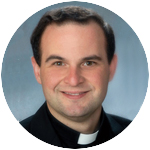
Father Eric J. Banecker
Our endless and exhausting culture war entered a new phase of insanity with the leaked draft of an opinion that would — if it actually emerges as the official opinion of the Supreme Court — overturn the Roe and Casey opinions, which asserted a right to abortion based on a legally implausible reading of the 14th amendment.
Such a decision — again, if it actually becomes the official decision of the court — would not ban abortion, but would simply return the question of abortion to the elected representatives in the various states whose job it is to, you know, pass laws on important questions of the day.
It is imperative that the right to life for all be defended, including in our laws precisely because a country that denies basic rights to the innocent is undermining any other rights claims. But that makes the legal protection of unborn children necessary but not sufficient in our goal of promoting the dignity of all human life.
[hotblock]
The response of those who have been working for decades for this day — if it has in fact arrived — must not be strutting but digging into the trenches to provide all the material and spiritual support women need in order to choose life for their children.
This does not simply mean in the advocacy and social services we provide — though that is important. But it also means that our own ways of doing business in the church — our employment policies, our workplace cultures, how welcoming we are to persons with disabilities — must be reevaluated to make sure we are conforming to a whole-life ethic, a care of the whole person.
It is indeed sad how many people fail to see how connected the question of abortion is to everything from the unhealthy power of corporations to environmental degradation to tax policies to budget decisions which allow for massive defense spending while leaving families with children to their own devices (literally).
It strikes me that the teaching of the Catholic Church on abortion, just like so many other controversial moral issues like contraception and gay marriage, truly make sense only within the context of the Gospel. At the end of the day, what changes hearts and minds — and thus entire societies — is not the judicial branch or the legislative branch but the announcement of salvation: “We know that Christ, risen from the dead, dies no more. Death no longer has any power over him” (Romans 6:9).
Only if women and men have accepted the full force of Christ’s atoning death and his glorious resurrection and have committed themselves to living “no longer for themselves but for him who died and rose again” can they begin to make sense of these and other moral questions (2 Cor 5:15). Then, it no longer becomes about political tribes or trying to balance fundamentally incompatible rights claims.
Instead, it becomes about the personal adventure of fidelity: how must I change the pattern of my life to conform to the one who thought enough of me to suffer on the cross? This response of the disciple includes within it the announcement of salvation to others, so that they too can experience the liberating effects of the Gospel. Only within a community of people committed to Christ do her moral teachings seem not cruel or hopelessly backward but illuminating.
In other words, the work of the church is the salvation of souls, and that can only be accomplished cor ad cor loquitur – with heart speaking to heart. The church’s mandate is religious, not political. Her vision is a society completely imbued with the Gospel such that all people are cared for with the same charity of Christ who, after washing the feet of the apostles, gave his life for them and for us.
The Kingdom of God faces resistance in every age, including from our own disordered hearts. But in this season of Easter, we know that Christ has already inaugurated it. May we do our part of extend his reign in our day and in the places we call home.
***
Father Eric J. Banecker is pastor of St. Francis de Sales Parish, Philadelphia.
PREVIOUS: People concerned about climate also yearn for community
NEXT: Life of conversion begins with baptism, peaks with Eucharist


Share this story